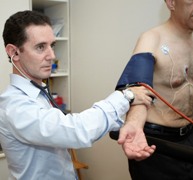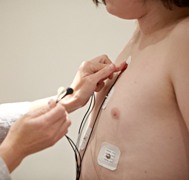What is Hypertension?

Blood pressure is the pressure of blood within your arteries as it is pumped around your body by the heart. As the heart pumps, the flow of blood in the arteries and the blood pressure rises and falls in a regular pattern. Blood pressure peaks when the heart pumps – called systole – and falls when the heart relaxes – called diasole – hence two readings (eg. 120/80).
Blood pressure depends on two main things: the volume of blood being pumped by the heart and the resistance that your arteries offer to this flow. There are many substances produced by the body that can affect the tone of your arteries and therefore affect blood pressure.
Blood pressure fluctuates throughout the day depending on time of day and activity.
Hypertension is the medical term for persistently elevated high blood pressure that places your heart, circulation and other organs at risk of potential damage in the future.
Symptoms

Blood pressure is measured using a sphygmomanometer in millimetres of mercury [mmHg].If your systolic blood pressure reading is 120mmHg & your diastolic 80mmHg, your doctor will record it as 120/80.
Causes of High Blood Pressure
The exact cause of hypertension is often not clear. People who are susceptible often have a family history of hypertension.
It is important to control your blood pressure because it is one of the main risk factors for heart disease, stroke and other blood vessel disease
Other important risk factors include:
- Smoking
- High cholesterol
- Diabetes
- Overweight
- Being physically inactive
- Depression
Diagnosis

Treatment
Some people are able to lower their blood pressure by making lifestyle changes such as:
- Healthy eating
- Low sodium/salt intake. Aim for 4g of salt a day [ 1550mg sodium a day]
- Increase your potassium intake [wide variety of fruits and vegetables]
- Maintain healthy weight.
- Limit your alcohol intake – no more than 2 standard drinks per day for men & 1 for women, with at least 2 alcohol-free days per week.
- Try and do at least 30 minutes of moderate exercise on all or most days of the week.
- Do not smoke
Medications
Many people will also need to take blood pressure lowering medications [anti-hypertensives] to reduce their blood pressure to safe, controlled levels. There are a large variety of medicines available and very often a combination of 2 or more is required to achieve optimum control. They do not cure hypertension but they do control it and need to be taken regularly as prescribed.
Finally it is very important to continue to have your blood pressure monitored regularly so that adjustments can be made to your treatment if required to achieve the most optimal long-term result. As blood pressure does vary during the day, multiple readings are often required to get a true picture of your blood pressure. Your doctor may order a 24-hour blood pressure monitor for this purpose.
